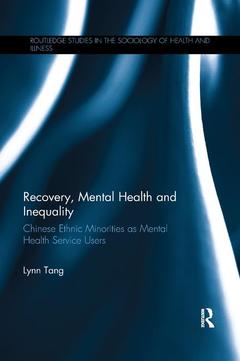Recovery, Mental Health and Inequality Chinese Ethnic Minorities as Mental Health Service Users Routledge Studies in the Sociology of Health and Illness Series
Auteur : Tang Lynn

Mental health has long been perceived as a taboo subject in the UK, so much so that mental health services have been marginalised within health and social care. There is even more serious neglect of the specific issues faced by different ethnic minorities.
This book uses the rich narratives of the recovery journeys of Chinese mental health service users in the UK ? a perceived ?hard-to-reach group? and largely invisible in mental health literature ? to illustrate the myriad ways that social inequalities such as class, ethnicity and gender contribute to service users' distress and mental ill-health, as well as shape their subsequent recovery journeys.
Recovery, Mental Health and Inequality contributes to the debate about the implementation of ?recovery approach? in mental health services and demonstrates the importance of tackling structural inequalities in facilitating meaningful recovery. This timely book would benefit practitioners and students in various fields, such as nurses, social workers and mental health postgraduate trainees.
Chapter 1. What recovery? Whose recovery? Recovery as a disputed approach
Chapter 2. Exploring social inequalities with the Capabilities Approach and Intersectionality Analysis
Chapter 3. When things start to fall apart: social conditions and the loss of capabilities
Chapter 4. Becoming a psychiatric patient
Chapter 5. Life after shipwreck: social conditions for capabilities (re)development
Chapter 6. Stubbornly strive to be human: meanings of recovery, hope and adaptive preferences
Chapter 7. Social conditions for recovery: Towards a social justice agenda
Methodological epilogue. Developing the service user knowledge of Chinese communities
Lynn Tang is Assistant Professor in the School of Arts and Humanities, Tung Wah College, Hong Kong.
Date de parution : 05-2019
15.6x23.4 cm
Disponible chez l'éditeur (délai d'approvisionnement : 14 jours).
Prix indicatif 53,83 €
Ajouter au panierDate de parution : 06-2017
15.6x23.4 cm
Disponible chez l'éditeur (délai d'approvisionnement : 14 jours).
Prix indicatif 160,25 €
Ajouter au panierThèmes de Recovery, Mental Health and Inequality :
Mots-clés :
Recovery Journeys; Recovery; Inequalities and Ethnic Minorities; Chinese Community Centre; The Journeys of Chinese Mental Health Service Users in the UK; Chinese Communities; Lynn Tang; Chinese Service Users; mental health; Service Users; social inequalities; Individual’s Capabilities Set; ethnicity; Mental Health Service Users; class; Exercisable Opportunities; gender; Mental Ill Health; sociology; Capabilities Approach; health and social policy; Overseas Brides; service user; Translocational Positionality; Chinese; Capabilities Loss; Britain; Capabilities Deprivation; Chinese Catering Business; Service User Identities; Critical Realist Exploration; Recovery Approach; UK Mental Health; UK Life; UK Labour Market; Intersectionality Analysis; Adaptive Preference; Mainland China; Service User Movement



